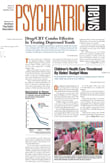Women with posttraumatic stress disorder (PTSD) have a greater number of medical conditions such as arthritis, lower back pain, obesity, and hypertension, and worse health status overall than women with only depression or with neither disorder, according to a large new study of women veterans.
“While it is well established that depression is associated with poor physical health, we found that women with PTSD in addition to their depression had even worse physical health than women with depression alone,” said Susan Frayne, M.D., M.P.H., who is the study's lead investigator and an advanced research career development fellow at the Center for Health Care Evaluation at the VA Palo Alto Health Care System and Stanford University. The finds are described in the June 28 Archives of Internal Medicine.
Frayne and her colleagues from the Veterans Affairs hospitals in Menlo Park, Calif., and Bedford, Mass., examined survey data from about 30,800 women veterans who responded to the 1999 Health Survey of Veterans to determine whether a doctor had ever diagnosed them with PTSD, depression, or a number of nonpsychiatric health problems such as chronic lower back pain, high blood pressure, obesity, emphysema, or cancer.
A total of 4,348 women reported they had been diagnosed with PTSD, 7,580 with depression, and 18,937 reported that they'd never been diagnosed with either condition.
Nearly 90 percent of the women who reported ever having been diagnosed with PTSD indicated that they had at least one medical condition, with arthritis, chronic lower back pain, obesity, and hypertension topping the list.
Frayne and colleagues found that regardless of age, the number of medical conditions was higher in women with PTSD than in women with depression alone or with neither disorder.
For example, among women younger than age 45, the mean number of medical conditions was 1.8 for women with PTSD, 1.5 for women with depression, and 1.1 for women with neither disorder.
Among women aged 65 and older, the mean number of medical conditions was 3.3 for women with PTSD, 3.1 for women with depression, and 2.6 for women with neither.
Frayne also used information from the Veterans SF-36 instrument to obtain information about four domains of physical health: physical functioning, role limitations due to physical problems, bodily pain, and energy/vitality.
Each of these four scales is scored from 0 to 100, with 100 being the best possible score in each area.
When Frayne examined role limitations due to physical problems, she found that among women with PTSD under age 45, the mean score was 31. That score jumped to 47.2 for women with depression and 69.1 for women with neither condition.
Women with PTSD in the same age range also reported experiencing more bodily pain and scored lower on the SF-36 instrument (39) in this domain than women with depression (47.6) or neither condition (58.9). On this scale, which ranges from 0 to 100, lower scores indicate greater bodily pain.
Frayne told Psychiatric News that while the study was not designed to determine the nature of the link between PTSD and poor physical health, several mechanisms may underlie the association.
“Other work has indicated that a history of trauma exposure can be associated with chronic neuroendocrine dysregulation and with risky health behaviors such as smoking or substance use, which can potentially contribute to ill health,” she said, adding that more research needs to be conducted to explore this key link.
While recent research has pointed to the importance of access to mental health services for veterans with PTSD, Frayne said her study “indicates that attending to the physical health needs of women veterans with PTSD is also critical.”
“Psychiatrists may be in an excellent position to connect women who have PTSD with needed services for their comorbid medical conditions,” she pointed out.
An abstract of the article, “Burden of Medical Illness in Women With Depression and Posttraumatic Stress Disorder,” is posted online at<archinte.amaassn.org>.▪
